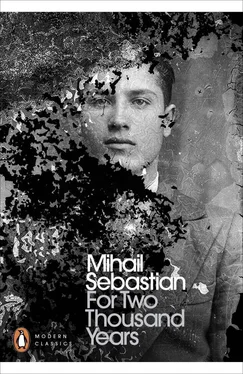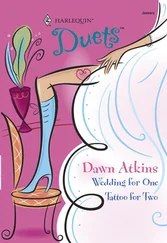‘Who put these pictures here?’
‘I did. Sometimes I come to the cabin to read. I don’t know, I find it more beautiful here. As if I weren’t alone. I have someone from the refinery to get a fire going in the stove and then I come and spend an hour or two. Look there, in the cupboard, there’s tea, rum and sugar. You can’t imagine how I like doing the housekeeping here, where you two stayed. And look what lovely expressions you have, you and Dronţu, in the photos.’
She laughs. She goes up to the chimney and curls an arm around the post on the right, as though around a man’s neck.
It’s hot, the water for the tea snoozing in the teapot, a dry oak log crackling in the fire. The windows are white with snow and it gives me the feeling that we are far away, in a mountain refuge, overtaken by an avalanche that has cut off our route of return. For a moment, I wonder if I’m going to get up and walk over to Marjorie and take her in my arms and kiss her. We look at each other for a long time, like in a children’s game where you have to try not to be the one to blink first. I close my eyes and my questions receive no answer: yes? no? yes? no?
A long night with Maurice Buret at the Coupole. All humanity parading before our 1.25-franc glasses of beer. Smiles, shouts of surprise, short familiar scenes, loves, betrayals, dramas … The spectacle became slowly more drunken, with the imperceptible passage of time.
The Coupole isn’t a café, it’s a continent, and Maurice isn’t an onlooker, he’s an explorer. He observes it all, down to the finest detail, understands the show, organizes it. He’s keenly perceptive. Among an apparently ordinary group, his eye discovers every possible passion. From the smallest clues under the indifferent light of the electric globe-lamps, a bare hint is enough for him to penetrate the private life of a café patron, or comedies or disasters hidden behind an expressionless smile. An adulteress, an unhappy lover, a young first-time pederast, an Anglo-Saxon blonde, still chaste and dazzled by the lights of Paris, a youthful adventurer, a grey-haired cynic, a dark-haired femme fatale looking for her ethereal other half …
Anybody might be a hero, every gesture the beginning of a drama. From our table, Maurice patiently watches the film unspool and notes decisive moments. Nothing in this immense hall, nobody in this agitated throng, escapes his vigilance. The spectacle is complex, but ordered. A smile from the third table to the left of the pillar may not reach its target, but it won’t be lost on Maurice, who will follow its trajectory and discover, in the far corner, the one for whom it was intended.
Maurice knows the geography of the Coupole because he has constructed it. A veteran drinker of 1.25-franc glasses of beer, he has also bought an observation post from where he deciphers nightly the mysteries of the quarter and its inhabitants. For Maurice, this population is divisible into couples, families and social groups, to the point where from one table to the next, from booth to booth, from the first floor to the ground floor to the street, there is an entire chain of networks and connections, giving unity, order and logic to a world spinning dizzyingly with colours, lights and voices.
Any adventures that have gone on here, Maurice has known about. Some only guessed at, others given away by an exclamation or a pallor, others, in the end, tracked down methodically from day to day, from happening to happening. This fellow has one great passion, which he has cultivated: curiosity.
(Curiosity also led him into medicine, as I don’t know what could have made him a doctor except his taste for provoking and hearing confessions.)
Observing gives him far greater pleasure than living does. Nothing that happens to him personally interests him except as an extra experience. He doesn’t require his own life to be more than just another spectacle, similar to that vast Coupole through which people come and go, in a vain race that is only redeemed by the secret pleasure of watching and comprehending.
Of the several Maurice Burets I know (as this man has enough raw material for four or five successful characters), the most interesting is the Maurice Buret of the Coupole, with his ruffled grey conventional clothing, a hat that’s neither new nor old, dress spats of an unremarkable sort. He has the drab appearance of any passer-by, lost in the crowd, neither handsome nor ugly, with nothing rough, insolent or seductive in his aspect, giving him the right to always stroll through life without anybody turning their head when he passes, a man among a thousand, a hundred thousand, settled in front of a glass, past which a curtain is being raised to reveal a theatre of accidental heroes, playing before this watchful and faithless witness.
‘See that brooding brunette over by the mirror?’ he asked me about two weeks ago. ‘What a goose she looks. I’d be surprised if she didn’t hate men and love women. Either she’s waiting for a lover or seeking one. Now look what a dramatic face she’s making.’
A couple of evenings ago, Maurice completed his ‘dossier’ of observations.
‘The brooding brunette is definitely looking for a match. How about the blonde on the right? No, not the one at the big table. Look closer, the second, the third, yes, the third on the right. Pretty, isn’t she? They smiled at each other a couple of times this evening. You know, they wouldn’t make a bad couple.’
The study continued over the following evenings. The small blonde became known by Maurice — I don’t know why — as ‘blonde Aline’, while the exchange of smiles and invitations between the two tables progressed visibly. I doubted the outcome, however. The ‘moody brunette’ was on her own and there was no difficulty there, but ‘Aline’ was always with a large party of young men and women.
‘You’re wrong, Maurice. You invent novels everywhere. You have the soul of a detective.’
‘I could be wrong. I still maintain they’re a potential couple, and there’s a chance they’ll get together.’
For a few days I didn’t make it to the Coupole. (I was working at the time on some plans for the master and sent them on to Bucharest. It really seems that in summer work might start at Le Havre for Rice Operations. It’s not final, but it is likely.) So for a while I didn’t make it to Montparnasse. Last night, entering the Coupole, the first thing I noticed, not without a genuine jolt, was the two girls — ‘moody brunette’ and ‘blonde Aline’ — talking on their own at a table, the former sombre and passionate, the latter submissive, and clearly excited.
Maurice, in his usual seat, savoured his victory with modesty, but not without a vague smile of triumph. I think he felt a kind of paternal sentiment, an authorial pride concerning the romantic couple, which he had predicted from the earliest hints.
‘You’re happy, and proud of yourself!’
‘“Happy” is putting it too strongly. I’m pleased my findings have been confirmed. Success in the laboratory, if you will.’
I’ve no desire for psychological studies. And, if I had, the example of Maurice Buret would cure me once and for all.
The only unmistakable quality I can recognize in people is indifference, which constitutes for me the height of civility as well as a guarantee of security and peace. I’ve never despaired about the so-called tragedy of one person never being able to know another or the thought that two people can spend a lifetime together without one ever knowing what is really going on deep in the soul of the other. Far from being painful to me, the thought of the impenetrable solitude our nature destines us to cheers me up. It satisfies in me an old nostalgia for a healthy, reliable and certain ignorance, the only durable thing in a world where truth is provisional and uncertain. To honestly not know is a first step towards salvation. I say this without irony, with a grain of exaggeration at most, precisely to disapprove more strongly of Maurice’s psychological experiments.
Читать дальше












